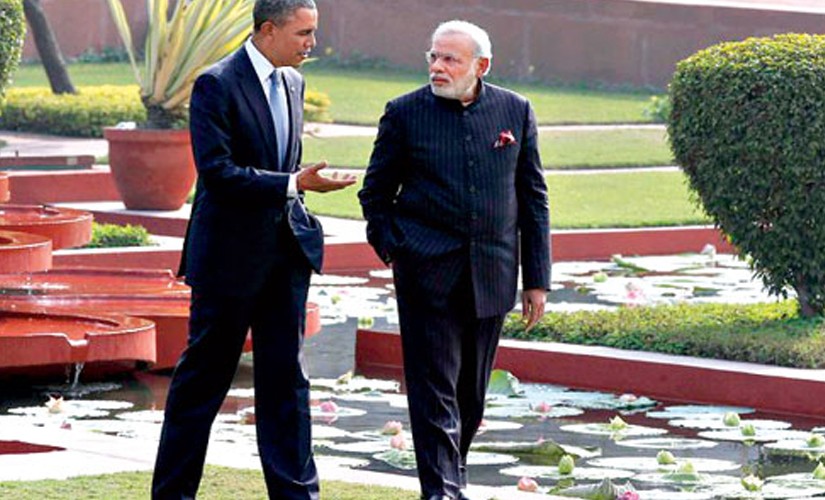
The much awaited and long-delayed modus-vivendi between India and the US over the finalization of the civilian nuclear cooperation agreement that began in July 2005 has finally been achieved Sunday (Jan 25) on the first day of US President Barack Obama's visit to India.
The major obstacles were the nature of the liability clauses in the event of any nuclear accident or incident which India wanted and the nuclear-reactor inspection rights that the US had sought. India had introduced a nuclear liability law in 2010 -- as it happens, at the behest of the BJP which was then in the opposition -- that placed the liability on the supplier in the event of a nuclear accident. This is at variance with the global norm which places the liability in such exigencies on the operator. However, this stipulation was not acceptable to the US.
The US, in turn, sought to impose 'flag rights in perpetuity', meaning that in the event India acquired a US nuclear reactor, the US would retain the right in perpetuity to inspect any material or equipment that was being used in or associated with the said reactor. India saw this as an infringement of its nuclear sovereignty and resisted such a clause.
Consequently, the much anticipated civilian nuclear cooperation commerce between the US and India remained a non-starter and the issue continued to fester from late 2008 when the (George W.) Bush administration had gone the extra mile to tweak its domestic legislation to accord India an exceptional status in the global nuclear domain.
The BJP-led NDA government, which assumed office in May 2014, had prioritized the nuclear issue and Prime Minister Narendra Modi indicated that this matter would receive the highest political attention when he visited the US in September 2014 for his first meeting with President Obama. However, despite a series of meetings between the officials on both sides over the last few months, it appeared that a compromise on the nuclear issue remained elusive.
The dramatic "breakthrough" - as Obama himself described it - announced Sunday is to be welcomed and is indicative of the joint political resolve that the Modi-Obama combine has been able to demonstrate to redress a long festering issue that has prevented the India-US bilateral relationship from realizing the potential benefits embedded in the radical breakthrough of July 2005 that had ended India's nuclear isolation in the global comity.
It may be recalled that even in July 2005, when then prime minister Manmohan Singh had met with then US president George W. Bush in Washington, the radical civilian nuclear cooperation agreement needed the last minute high level political nudge to reconcile the differences between the two sides. History may have been repeated this time in Delhi.
The impact of this Delhi breakthrough on the nuclear issue will re-energize and reset the moribund India-US bilateral relationship and this will in all likelihood have a beneficial ripple effect on all the other issues that are awaiting traction during the current Obama visit.
Hopefully, India will be able to overcome some of its earlier inhibitions regarding the foundational agreements as regards the defence and military sector and this, in turn, will allow Delhi to begin actively reviewing the high technology possibilities that were first mooted in July 2005 and then signed October 2008.
This has been a long wait but the Modi-Obama 'chai pe charcha' (conversation over tea) has cleared the logjam. The eagle and the elephant may still tango!
(C. Uday Bhaskar is Director, Society for Policy Studies. The views expressed are personal. He can be contacted at cudaybhaskar@spsindia.in)
Solar Mission Aditya L1: We have grasped the moon... now it is the turn of the sun... Yes, this s
On Wednesday, the High Court has asked tough questions to the Delhi government regarding the lack
Google Pixel 4a 5G can be launched in India on this date, to compete with OnePlus Nord
Tech giant Google has launched its two new Pixel phones Pixel 5 and Pixel 4a 5G in the global mar
Document Leak: Congress leaders target Petroleum Minister
New Delhi, Feb 20 (IANS) Congress leaders Friday targeted Petroleum Minister Dharmendra Pradhan
Nothing new in President's Address: Congress
New Delhi, Feb 23 (IANS) The Congress Monday said President Pranab Mukherjee's address to parli
Former National President of Janata Dal-United and former Union Minister Sharad Yadav died at For
Involve Youth in PM's Initiatives, says President
New Delhi, Feb 11 (IANS) Describing youth as the potential "engine of growth", President Pranab
What will be the impact of India buying less oil from Saudi Arabia?
On 2 March, a vessel carrying 1 million tonnes of crude oil from a port of Guyana left for Mundra
India has to face New Zealand in its last group match. This match will be played in Dubai on Marc
One after another happiness is knocking at Abhishek Malhan's house. First, he won season 1 of Bat